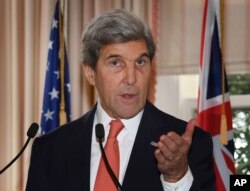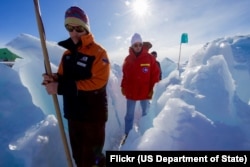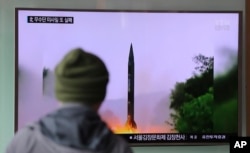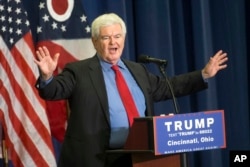U.S. President-elect Donald Trump's campaign rhetoric has sowed anxiety and confusion about the foreign policy path he will pursue.
During the Republican primaries and in the general election contest against former secretary of state Hillary Clinton the wealthy businessman was vague on some key issues, including the fight against the so-called Islamic State group.
On other matters he was consistent and adamant: advocating rejection of the 12-nation Trans-Pacific Partnership, renegotiating the nuclear deal with Iran and withdrawing from the Paris climate agreement; all centerpieces of the Obama administration.
The TPP remains important despite reports the White House has given up on congressional approval, U.S. Secretary of State John Kerry told reporters in New Zealand Sunday.
Climate change
As far as the climate change treaties to which the United States has agreed "we will wait to see how the next administration addresses this, but I believe we're on the right track, and this is a track that the American people are committed to because the majority of the American people believe climate change is, in fact, happening and want to see us address it," Kerry added prior to heading to Oman.
Visiting Antarctica last Friday, the top U.S. diplomat appeared to call for citizens to actively oppose Trump's skepticism toward climate science.
"We need to get more of a movement going," Kerry told several hundred scientists there. "We need to get more people to engage."
Despite an incoming administration that appears intent on wrecking much of what he and predecessor Clinton constructed, Kerry has instructed an orderly transition at the State Department.
"Our focus over the next couple months is making sure the transition runs as smoothly and as efficiently as possible, State Department spokesman John Kirby told VOA.
The Trump transition team, he added, will be warmly welcomed and the incumbents will "do all we can to ensure they have the information they need to prepare to lead this department."
Foreign policy
Profound concerns about Trump's foreign policy direction are being expressed by former senior officials appointed to posts under both Democratic and Republican presidents.
The president-elect has "denigrated our NATO allies while praising Russia's Vladimir Putin, disparaged our Asian allies Japan and South Korea, pledged to keep Muslims out of America and repudiated the Mexican people in vulgar terms," said former undersecretary of state for political affairs R. Nicholas Burns.
Trump's "rash and unwise statements have already damaged American credibility in the world," added Burns, now a professor at Harvard's Kennedy School of Government.
Regarded as a businessman who makes gut decisions rather than mulling nuances, many foreign policy experts do not envision Trump devouring thick briefing books or refereeing lengthy debates among advisors.
The executive director of the Center for Transatlantic Relations at Johns Hopkins University's School of Advanced International Studies, Daniel Hamilton, told VOA the relationship with Europe faces a transformation if the Trump White House requires allies to "pay in full" for the U.S. security presence there, as well as NATO itself.
Foreign policy analysts also expect Trump to re-evaluate Obama's pivot to the Pacific, but some predict he will conclude it best to leave intact the alliance system with Japan and South Korea as an effective, long-term counter to China's rising military might, and amid an escalating nuclear and ballistic missile threat from North Korea.
Moscow and Washington
A Kremlin spokesman has declared President-elect Donald Trump's foreign policy approach "phenomenally close" to that of Russian President Vladimir Putin.
"That is probably a good basis for our moderate optimism that they will at least be able to start a dialogue to start to clear out the Augean stables in our bilateral relations," said Dmitry Peskov in remarks aired by Russian state Channel One television Thursday.
Among the most commonly heard names for Trump's selection as secretary of state are Senate Foreign Relations Committee chairman Bob Corker and John Bolton, a former U.S. ambassador to the United Nations.
Corker, a Republican, is regarded as intense, but a pragmatist and dealmaker.
Bolton is a self-declared "libertarian conservative" known for his confrontational personality and disdain for protracted diplomatic negotiations and wary of treaties.
Former speaker of the House of Representatives, Republican Newt Gingrich, known for his tough stances on Iran and North Korea, is also mentioned, although in recent days he has expressed a desire to be involved in making policy decisions for the new administration, presumably from inside the White House.
Also touted as a possible secretary of state is Senator Jeff Sessions, an Alabama Republican on the Armed Services Committee.
Others under consideration, according to The New York Times, are former U.S. ambassador to Afghanistan Zalmay Khalilzad and retired Army General Stanley McChrystal, who commanded U.S. forces in Afghanistan.
Recruiting a highly competent team below Cabinet secretaries for the new, inexperienced team may prove a challenge amid vows expressed by some "Never Trump" Republicans not to work in the new administration.
Talent abounds in Washington, but experienced foreign policy specialists, be they Republican, Democrat or independent, tend to be internationalists and if Trump pursues a hardline isolationist approach, the loyalty of those underlings may prove tenuous.









